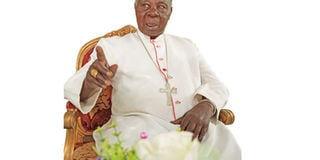Cardinal Wamala is my role model

Cardinal Emmanuel Wamala, former Archbishop of Kampala Archdiocese. PHOTO BY RACHEL MABALA
What you need to know:
Motivating. Prof Peter Kasenene says poses values such as selflessness, humility and respect for people, which he cherishes, writes Desire Mbabaali
“Born in a humble home in Mbarara town, and his dream of becoming a priest falling short at Kitabi seminary, Prof Peter Kasenene never gave up his pursuit to learn the deeper things of God.
“I did a short course at the University of Geneva in ecumenical studies. I came back and did masters at Makerere University and my PhD at the University of Cape town, South Africa. I then started teaching religious studies at Makerere University between 1974-1980,” he says.
He then moved to Kenya and taught at Kenyatta University and the University of Nairobi and later at the University of Swaziland for 12 years, after which he returned to Uganda.
“In 1995, I started teaching at Kyambogo University until 1999 when I went to Kigali on sabbatical. In 2001, I branched off to politics and was appointed minister of state for Finance, in charge of privatisation up to 2006. From that time, I became a full time plantation developer. I grow trees,” Prof Kasenene says.
Star of my life
But whoever we are, no matter how high our star may rise, there are people, principles, values, ideas that daily shape our attitudes and character. People we look up to while pursuing our own paths. Our own stars. To Prof Kasenene, that person is Cardinal Emmanuel Wamala, former Archbishop of Kampala Archdiocese.
“He is the person I have strong admiration for. I have worked with him, like I have worked with many people, but I find him a holistic person. He is a very intelligent man, well read, he is respectful and mindful of people in the way he relates with them, he is humble, selfless. For me, those are values I cherish a lot,” he says.
He further mentions that once one’s value is to only look out for themselves, they can never do anything right since they will always focus on doing what benefits them, even if it hurts other people.
“To me, if you are such a person, you cease to be human. But Cardinal Wamala is a selfless and humble man who isn’t conscious of what he is, but always conscious of the person he is talking with; and that is very important,” he adds.
“He treats everybody the same, regardless of who you are. I remember one time there was a meeting in his house. I came late, and he stood up – for us the Catholics, a cardinal is a very important person, but this man stood up and said, “please, seat here,” - offering me his seat. Up to now, that’s something I look at and marvel at how humble he is,” Prof Kasenene reminisces.
He also looks at Cardinal Wamala as not being just an achiever – in common language, someone successful, but rather one having a fulfilled life.
“That is a person I admire,” he says, adding, “Cardinal Wamala has the quality and value of life I respect and wish I could have; which I have not yet succeeded in having.”
The two have also interacted on several occasions; for example when Cardinal Wamala was the archbishop, Prof Kasenene was the head of the Catholic laity in Uganda and so they worked together at different administrative levels.
“More recently, because he has retired and he is old, I went at his home to just pay him a visit,” Prof Kasenene says.
Values and principles
Some of the principles Prof Kasenene stands by, some of which he has continued to profess in his inspirational books such as You Can: Be or have whatever you want, is the coexistence of two persons in one.
“A human being exists like an onion – with layers. He has an inside self, and an outside self. Though they are living together, they are separate. And this is a very important understanding; knowing that the inside self controls the outside self,” he explains.
He also believes that if on the inside there is will and determination, there will be a way.
“For example, the reason you don’t have a building in Kampala is because you don’t have a vision for that,” he adds. Moreover, everyone has control over their inside self, and if the inside self controls the outside self, then one is able to control their actions.
“So if you want to change the outside of anyone, just change the inside,” Prof Kasenene says. In addition, he believes that everyone is equal, and that nobody is more important than the other.
“That helped me very much when I was in government. If I was meeting with the President, I regarded him like any other person – though of course I respected his office and protocol. In a like manner I treated my fellow ministers and my driver. I didn’t put a distinction between them,” he says.
“Well, I am a professor, but I often laugh at the way people will treat me just because I am a professor, and not treat me because of who I am,” he adds in conclusion.”




